|
|
|
Sort Order |
|
|
|
Items / Page
|
|
|
|
|
|
|
| Srl | Item |
| 1 |
ID:
116695
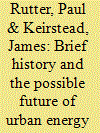

|
|
|
|
|
| Publication |
2012.
|
| Summary/Abstract |
Modern cities depend on energy systems to deliver a range of services such as heating, cooling, lighting, mobility, communications, and so on. This article examines how these urban energy systems came to be, tracing the major transitions from the earliest settlements through to today's fossil-fuelled cities. The underlying theme is "increasing efficiency under constraints" with each transition marked by increasing energy efficiency in service provision, increasing per capita energy use, increasing complexity in the energy system's structure, with innovations driven by a strategic view of the overall system, and accompanied by wider changes in technology and society. In developed countries, the future of urban energy systems is likely to continue many of these trends, with increased efficiency being driven by the constraints of climate change and rising fuel prices. Both supply and demand side technologies are discussed as potential solutions to these issues, with different impacts on the urban environment and its citizens. However in developing countries, rising urban populations and access to basic energy services will drive the next transition.
|
|
|
|
|
|
|
|
|
|
|
|
|
|
|
|
| 2 |
ID:
112906
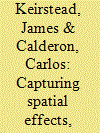

|
|
|
|
|
| Publication |
2012.
|
| Summary/Abstract |
Local authorities often rely upon urban energy and carbon modelling tools to develop mitigation policies and strategies that will deliver reductions in greenhouse gas emissions. In this paper the UK example of Newcastle-upon-Tyne is used to critique current practice, noting that important features of urban energy systems are often omitted by bottom-up tools including interactions between technologies, spatial disaggregation of demand, and the ability to pursue over-arching policy goals like cost minimization. An alternative optimization-based approach is then described and applied to the Newcastle case, at the scale of both the whole city and the South Heaton district, and using Monte Carlo techniques to address policy uncertainty. The results show that this new method can help policy makers draw more robust policy conclusions, sensitive to spatial variations in energy demand and capturing the interactions between developments in the national energy system and local policy options. Further work should focus on improving our understanding of local building stocks and energy demands so as to better assess the potential of new technologies and policies.
|
|
|
|
|
|
|
|
|
|
|
|
|
|
|
|
| 3 |
ID:
125587
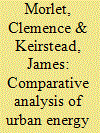

|
|
|
|
|
| Publication |
2013.
|
| Summary/Abstract |
Cities are at the forefront of efforts to combat climate change and in this paper, we examine the influence of urban energy governance on these policy goals. An innovative framework for quantifying the combined governance of cities and energy systems is presented before focusing on a detailed study of London, Paris, Berlin and Copenhagen. By applying an optimization model to assess the lowest cost technology pathways to achieve emission reduction targets, the links between the governance of urban energy systems and the cost of achieving carbon targets are shown. Additionally a novel metric of scenario similarity is introduced in order to evaluate the difficulty of hypothesized energy system transitions. The results indicate that these tools can be valuable in identifying similar cities for the sharing of best practice, for performing comparative evaluations of energy transitions, and for reinforcing the need to complement quantitative assessments with a more holistic appreciation of local context.
|
|
|
|
|
|
|
|
|
|
|
|
|
|
|
|
| 4 |
ID:
175900
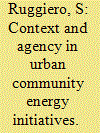

|
|
|
|
|
| Summary/Abstract |
In this paper, we analyse community energy (CE) projects in urban settings. Building on insights from the literature on the geography of sustainability transitions, we examine how contextual conditions promote or hinder the development of CE. Furthermore, reflecting on calls for greater attention to agency in transitions, we investigated how actors engaged in urban CE projects exploit beneficial conditions or overcome obstacles related to some of the contextual conditions. Empirically, we draw on six case studies of CE projects from the Baltic Sea Region. To develop a thorough understanding of our cases we conducted 24 semi-structured interviews and analysed numerous secondary sources. Our results show that institutions as well as visions, e.g. plans for future energy generation, are important contextual features for urban CE projects. Local actors seek to overcome unfavourable contextual conditions for CE initiatives by building trust, appealing to their community's sense of identity, networking, and promoting demonstration projects. Based on the results, we recommend that local and national governments address the following four issues to strengthen the role of CE in the transformation of urban energy systems: 1) harmonising policies; 2) creating a culture for transitions; 3) developing visions for CE; and 4) promoting policy learning from experiments.
|
|
|
|
|
|
|
|
|
|
|
|
|
|
|
|
| 5 |
ID:
166497
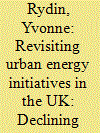

|
|
|
|
|
| Summary/Abstract |
In the first decade of the 21st century, there was considerable interest in the potential for reducing the reliance on centralised energy systems and introducing greater decentralisation through localised initiatives, particularly in urban areas. A range of such initiatives were evidence of an emerging movement for bottom-up change in energy systems. This involved a variety of actors, technologies, economic models and modes of engagement with the public. Indeed, research undertaken in the UK found over 50 possible pathways for change based on such urban energy projects. However, the following decade has seen considerable changes in the context for such initiatives, particularly with regard to national policy frameworks. Returning to a database collected in 2010–11, this paper analyses the nature of the projects that have survived and those that have not. It finds that the hope of localised urban action for changing energy systems rests largely with community-based projects, but that these are fragile, with limited capacity and dependent on having a sound financial model for their survival. The paper concludes with suggestions for how such localised urban action could be reinvigorated but also assesses the current role of such local action.
|
|
|
|
|
|
|
|
|
|
|
|
|
|
|
|
|
|
|
|
|